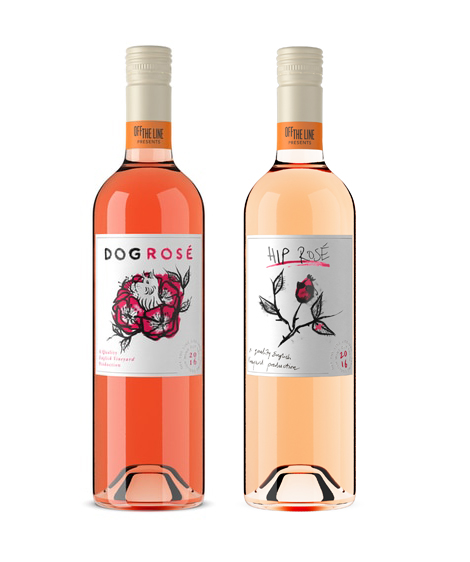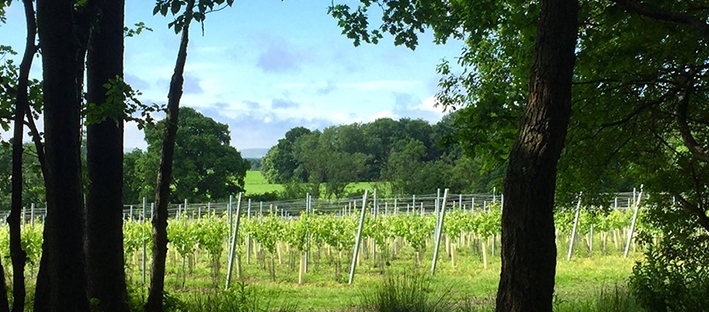
The English wine industry is changing rapidly right now. Sales are on the up and there seem to be new vineyards being planted all over England (even the cold bits). One of the most exciting changes is that so many women are at the forefront of this – Ambriel, Bolney, Fox and Fox, Hattingley Valley, Off The Line spring to mind.
Even by English vineyard standards, Off The Line is a beauty. Away from the new winery and the visitor’s centre (which is well on the way to being up and running), a short stroll down sloping pasture takes us to the vineyard itself. The varietals, planted in 2014, are set out so that defining them all is easy even for a student like me. And that careful attention to every detail persists throughout – from the beautiful wine labels to the wonderful wine itself.
While their contemporaries are producing predominantly sparkling wines, Off The Line’s passion for still wine is already making waves – with their first vintage released earlier this year receiving praise across the board. (In fact, the majority of wine sellers and vineyard owners who I have interviewed have cited Off The Line’s two rosés as some of their favourite Sussex still wines).
With their diverse mix of skills, civil partners Kristina Studzinski and Ann-Marie Tynan make a great team. Kristina was a government lawyer before a dramatic change of direction led her to start her studies at the ubiquitous Plumpton College. Ann-Marie, as well as having an established career as a ceramicist had been working in the wine industry for some time. Together, their dream of making wine in England has become a reality.
I was lucky enough to meet them both in the vineyard to quiz Kristina on their journey and plans for the future.
How did Off the Line start?
I made the radical decision to leave my legal career but we didn’t rush into it. I trained at Plumpton which was a chance to see if I had the aptitude. We organised placements in France together. I really loved learning about wine – the science and the practical side (like the tractor driving!). Over two years at Plumpton, we did two stints in France. We looked at options in France but realised that there were downsides to living there. One of the issues is the height of the fruiting zone there – it’s higher in England and that makes for easier harvesting (the theory is that the grapes the heat from the soil ensures that the grapes ripen better).
At Plumpton, I learnt how to identify a good piece of land for planting. Plumpton really got me turned onto the English wine industry and what was possible.
We really like Sussex, and now, there’s now a network of pickers and consultants and all the kit that you need so it just seemed like a no-brainer that we were going to settle here. I think the only issue that we had was how long it would take to find a site.

Why the name – “Off The Line”?
We wanted a modern name and something meaningful. ‘Off the Line’ comes from the vineyard site being next to an old railway line that used to run from Polegate to Edridge that was called the Cuckoo Line given the number of cuckoos that could be seen and heard in Spring. We like the symbolism of lines – taking you somewhere, transporting and delineating things.
How long did it take to find the land?
It didn’t actually take that long. We thought we would be looking for years and years. We knew the area and we chatted to Jonica Fox who has a vineyard at Mayfield (Fox and Fox). We concentrated on quite a small area and this land came up quite quickly. It was previously all pastureland and the owner bred heavy horses. There was quite a lot of interest in the land but the owner sold to us as I think that she was interested in it staying in agricultural use.
When did you buy and what’s the terroir like?
We bought in the Summer of 2013 and planted in 2014. The soil we have here is Weald clay over Tunbridge Wells sandstone which is what a lot of vineyards are planting on. Surprisingly, most of the best vineyards in Champagne are on a clay soil. In the winter it gets wet but dries out quickly. Our slopes are predominately south facing which gives us an advantage.
What varietals do you grow?
We grow only red grapes: Pinot noir, Regent, Dornfelder and Rondo.

How has the industry changed?
It’s really refreshing that there’s a new generation coming through. It’s not just retired army generals and privileged people as it perhaps used to be. It’s good to see that there a lot of strong women in the industry now – certainly within our circle. And I am involved with SEVA as the deputy chair.
As women in the English wine industry, how do you feel you have been received?
People sometimes assume that we’re smaller than we are which can be a bit annoying. On the whole I feel that we have been well received and we are judged by the quality of our wines and our success in establishing a vineyard. I see myself as someone who strives to live by example rather than to complain or critique although sometimes there is a need for that. Our goal is primarily to be a successful wine making business rather than to strike a blow for feminism as it is a passion for viticulture and wine making that drives us. I think there is a change in the industry with younger people coming through who see women as being achievers and leaders which is encouraging but there is still a way to go.

Do you make your own wine?
Next year we will – the winery is currently under construction. Up until now, we’ve been using Litmus who are based at Denbies in Surrey and they will make our wines again in partnership this year.
What do you do differently?
The fact that we’re focusing on growing red grapes puts us in a pretty unique position. We’re focusing on producing still rosé. Going forward, we’re going to be looking at doing a still red with Pinot Noir. That’s always been my ultimate ambition but we’ve got to get the fruit right.
Will you make sparkling?
I wouldn’t rule it out but we’re quite happy with the rosé at the moment and that’s our marketing angle. We really believe in getting the labels right and we’ve got a lot of new ideas for concepts going forward – it’s not just about the wine – it’s about matching the wine with the label and making a visual statement which tells a story of some kind and isn’t simply decorative. I don’t like the process of making sparkling wine although I like drinking it and I can appreciate its beauty. The simplicity of a still wine is more me. I’m more enamoured by that process. So the varieties that we chose were selected so that we could make rosé and red.
Viticulture is changing – how has your practice evolved?
Because we haven’t been going that long there’s not loads that’s changed but we have embraced foliar feeding. We’re in a nitrate vulnerable zone and I’m more aware of the fact that you have got to see a bigger picture when you’re using fertiliser – when you’re overloading the ground with fertiliser, you’re contaminating water courses. I initially wasn’t sure about it but I’ve seen that it’s really made a difference.

Have you found that you need to diversify?
We think that we can make enough from the wine but we are planning tourism on a small scale – small group tours. To actually see how it’s made and to learn more about the science is a really positive thing. A vineyard should be an uplifting place where you can see nature which brings you more in touch with how your food’s produced. I think that can only be a good thing – this is the generation that doesn’t understand that a chicken nugget is from an animal and that’s just obscene. When we have the winery, one of my ambitions is that people will be able to go into the winery and learn about winemaking, maybe even do a bit of blending themselves. It’s not some industrial process that’s really complicated – a lot of people think it’s more complicated than it actually is. We are likely to have capacity in our winery in years to come so are looking to partner up with another vineyard or to do contract wine making.
What do you think about still wines in England?
Chapel Down’s Flint Dry was one of the first English wines I ever had and that was inspiring. There are issues around English still and the quality’s not always there which is a shame but generally standards are rising. We were happy to get a silver at the UKVA awards and we have high hopes that we can achieve great things with still rosé as the quality of our fruit will improve as the vines mature. With climate change, the varieties that we grow are sustainable. Also, the crop is good from Rondo, Regent and Dornfelder – Rondo can crop at 12 tonnes per hectare which is double what you might get from the Champagne varieties. People talk a lot about Bacchus being the star still but I find it is often too full-on and on the cat’s pee spectrum – it doesn’t do it for me.
Which of your wines would you recommend to someone just discovering English wine?
Dog Rosé is the more accessible of our wines – you could have with a salad or with charcuterie. It’s a very easy drinking rose, subtle with lots of red fruit .
Why should people be drinking English wine?
Because it’s a local product, and it’s good! It’s not coming from the other side of the world, it’s good for our economy and it’s good for tourism. It’s a great national product.
Where should we try your wines?
Stockists include the The English Wine Centre, Gerry’s in Soho, Butlers in Brighton, the tasting room at Hidden Spring and we’re also selling it direct. Oh yes, and on 24 September our Dog rosé will be at the Chiswick Dog Show!
@sussexuncorked

1 thought on “Sussex Vineyard Interview No. 7: Off The Line”